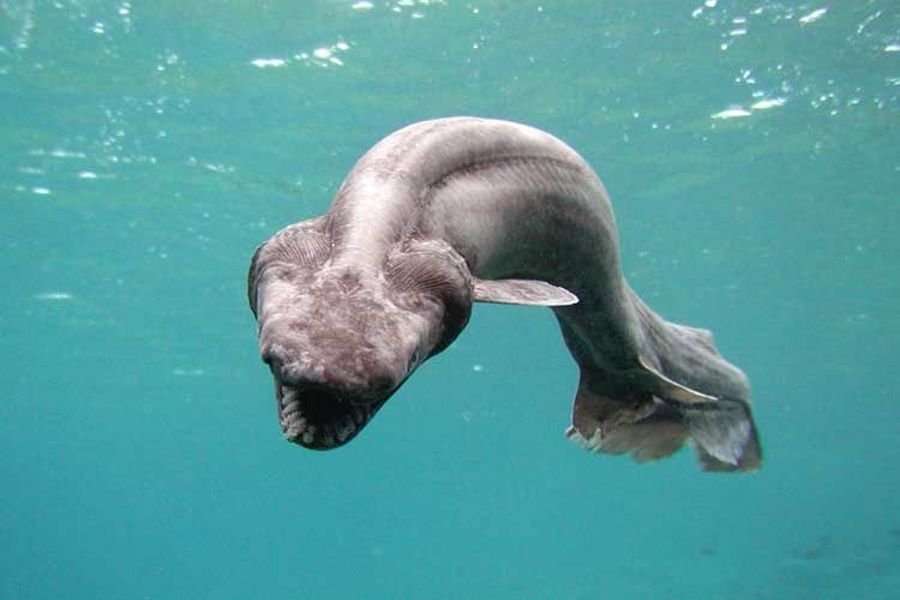|
|
||
|
.. Youtube Link Fang Tooth
|
||
|
This strange fish was caught in Asia - no details ..
|
||
|
Prehistoric Creatures Believed to have been Extinct Prehistoric shark captured on film Frilled Shark
The frilled shark
(Chlamydoselachus anguineus) is one of two extant
species of shark in the family Chlamydoselachidae,
with a wide but patchy distribution in the
Atlantic and Pacific Oceans. This species is found
over the outer continental shelf and upper
continental slope, generally near the bottom,
though there is evidence of substantial upward
movements. It has been caught as deep as 1,570 m
(5,150 ft), although it is uncommon below 1,200 m
(3,900 ft). In Suruga Bay, Japan, it is most
common at depths of 50–200 m (160–660 ft).
Exhibiting several "primitive" features, the
frilled shark has often been termed a "living
fossil". It reaches a length of 2 m (6.6 ft) and
has a dark brown, eel-like body with the dorsal,
pelvic, and anal fins placed far back. Its common
name comes from the frilly or fringed appearance
of its six pairs of gill slits, with the first
pair meeting across the throat.
Seldom observed, the frilled shark may capture prey by bending its body and lunging forward like a snake. The long, extremely flexible jaws enable it to swallow prey whole, while its many rows of small, needle-like teeth make it difficult for the prey to escape. It feeds mainly on cephalopods, leavened by bony fishes and other sharks. This species is aplacental viviparous: the embryos emerge from their egg capsules inside the mother's uterus, where they survive primarily on yolk. The gestation period may be as long as three and a half years, the longest of any vertebrate. Litter sizes vary from two to fifteen, and there is no distinct breeding season. Frilled sharks are occasional bycatch in commercial fisheries, but have little economic value. The International Union for Conservation of Nature has assessed it as Near Threatened, since even incidental catches may deplete its population given its low reproductive rate. This shark, or a supposed giant relative, is a suggested source for reports of sea serpents. SOURCE: Wikipedia |
||
400 million yearsago but found alive today with NO evolutionary transition at all! Macro-Evolution: --This is one thing changing into another over millions of years. Never been observed! In fact we have fossils supposedly 'millions' of years old that have no evidence of evolving AT ALL!!! Like the Lobe-finned fish (Coelacanth) if you want more examples let me know. I hear evolutionists say... it is because they are done evolving... but if you know the story: the lobe-finned fish was considered an INDEX fossil. (Therefore used to date certain rock strata) it was considered extinct at about 400 million years ago. Until whoops! there were found alive and well today! Source: Beginningingenesis.com/ The coelacanths (Listeni/ˈsiːləkænθ/
see-lə-kanth) constitute a now rare order of fish
that includes two extant species in the genus
Latimeria: the West Indian Ocean coelacanth
(Latimeria chalumnae) and the Indonesian
coelacanth (Latimeria menadoensis). They follow
the oldest known living lineage of Sarcopterygii
(lobe-finned fish and tetrapods), which means they
are more closely related to lungfish, reptiles and
mammals than to the common ray-finned fishes. They
are found along the coastlines of the Indian Ocean
and Indonesia. Since there are only two species of
coelacanth and both are threatened, it is the most
endangered order of animals in the world. The West
Indian Ocean coelacanth is a critically endangered
species. Source: Wikipedia |
||
|
Shades of Jurassic Park! Baby Mammoth Found in Siberia Mammoth DNA? .. |
||
| FAIR USE NOTICE: This page contains copyrighted material the use of which has not been specifically authorized by the copyright owner. Pegasus Research Consortium distributes this material without profit to those who have expressed a prior interest in receiving the included information for research and educational purposes. We believe this constitutes a fair use of any such copyrighted material as provided for in 17 U.S.C § 107. If you wish to use copyrighted material from this site for purposes of your own that go beyond fair use, you must obtain permission from the copyright owner. | ||
|
|




